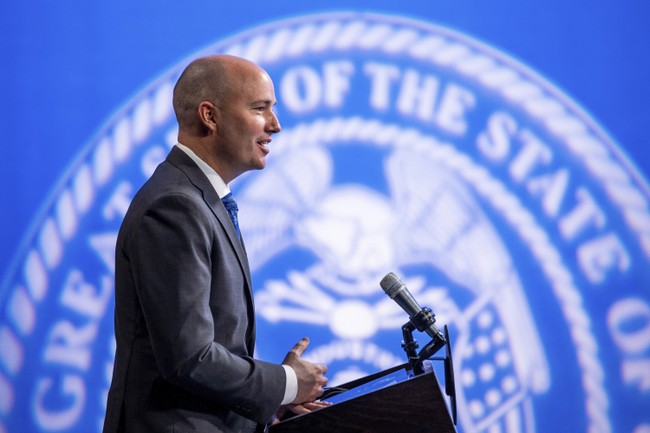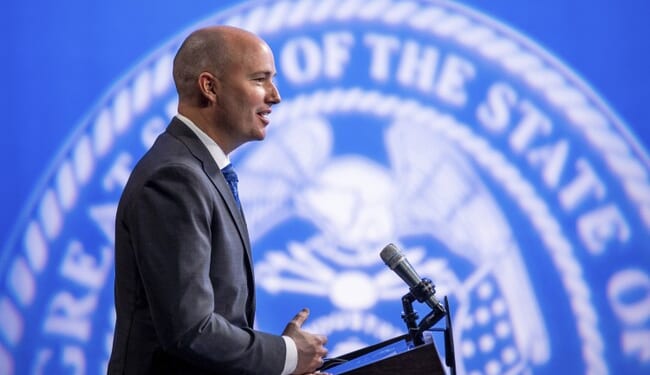
Since becoming a Republican, I have had a pretty good track record of attending the state conventions as a delegate. The Utah GOP is on a caucus-convention system. By way of a quick briefing, precincts hold caucus meetings to elect delegates who then go to the convention to vote on platform planks and nominate candidates. Utah election law also allows candidates to collect signatures to place themselves on the ballot without the need to meet with delegates or win a convention vote.
I missed the convention this year since Mrs. Brown’s surgery overlapped with Caucus Night. I figured my loyalty was to my wife over the party. And lo and behold, I got replaced as precinct chair and state delegate. Meh. The perks weren’t that great, anyway. Not even a dental plan.
As it turned out, if I had to miss a convention, this one was the one to miss. I got texts throughout Saturday from friends who had graced the gates, and they were not happy. This year’s gathering was held at the Salt Palace in downtown SLC. My friends told me they were crammed in, elbow-to-elbow like sardines, and that credentialing took two hours. The doors usually open at 7 a.m., and if everything comes off with a minimal amount of hitches, delegates are on their way home by mid-afternoon. This year, the convention reportedly dragged on almost until midnight.
No one wants to stay at anything that long. I’m sure many of the delegates had two words for the Central Committee, and those words were not “Merry Christmas” or “Let’s dance.” Utah is a big place, and I’ll wager that some of the delegates from the farther-flung regions of the state, faced with another night’s hotel stay or an interminable drive home, were contemplating taking up a collection to send the Central Committee a snack tray of knuckle sandwiches.
The reason for the lateness of the hour? This convention was particularly full of sound and fury. Delegates, feeling the sting of the last four years, were not interested in some of the incumbents. For example, Riverton Mayor Trent Staggs, who had an endorsement from Trump, defeated Congressman John Curtis for the Senatorial slot left vacant by the departing Pierre Delecto. Curtis is viewed by many of the Utah GOP faithful as a RINO, and Romney’s turn in the Senate has left a bitter taste in many mouths when it comes to incumbents. Curtis, however, remains in the running because he collected enough signatures to remain on the ballot.
But the big news was the gubernatorial race.
On Monday morning, this was sitting in my email inbox from Gov. Spencer Cox:
Hey friends,
Last Saturday, extreme right-wing delegates gave my opponent 67.5% of the vote after weeks of misleading voters about my record. Luckily, party insiders representing less than 1% of the Republicans in Utah DO NOT get to decide who represents Utah as the GOP nominee this November – Republican Primary voters do.
As with all emails from candidates, the usual request for donations followed.
Cox is headed for a primary. The Deseret News reports that in the final convention tally, Cox lost to State Representative Phil Lyman of Blanding. Lyman picked up 67.5% of the vote, as opposed to Cox, who garnered 32.5%.
Cox mounted the stage to a mixture of applause and boos, but the boos were strong enough that he decided to forego his prepared speech. He said in part:
I’m a little worried about our caucus convention system. There are a whole bunch of people out there who want to get rid of this. … I hope you’re not giving them more ammunition today…Maybe you’re upset that I signed the largest tax cut in Utah history. Maybe you hate that I signed constitutional carry. Maybe you hate that I signed the most pro-life legislation in Utah history. Maybe you hate that I sent troops to the border. Maybe you hate the 60 lawsuits we filed against President Biden in this administration. Maybe you hate that we stopped DEI and ESG and CRT. Or maybe it’s something much more cynical. Maybe you hate that I don’t hate enough.
It’s true that Cox did those things, but many have been upset with Cox since he used his preferred pronouns during a Zoom call with Utah students earlier in his term. Others have been critical of his performance when it comes to transgender issues.
The caucus-convention system has come under fire in recent years on the heels of the “Count My Vote” movement. Beehive Republicans saw that as a way to get RINOs and undercover progressives on the GOP ballot. System critics say that only the fringe elements attend the caucuses and the conventions and that extremists use the system to control the elections.
And then there is the general distrust of incumbents. People are feeling the sting of inflation and are tired of protests, DEI, CRT, the support of a foreign war, blatant corruption, lawfare, increasing regulations, the threat of higher taxes, and the transgender movement. There are those feeling betrayed by Republicans in Congress who have done little to check the movements of Democrats and who helped send billions in aid overseas. In Utah, people have watched the state turning purple. The anti-Israel protest at the University of Utah may have surprised some, but if you have lived here long enough, you know that the Crimson U has been bright blue for years.
Some pundits are predicting a Cox sweep in the primary election. And they may be right. By their very nature, caucuses and conventions attract people who are more politically active and vocal than the rank-and-file residents. There may be many out there who are of different minds on different issues but are reticent to speak out for fear of being labeled an extremist or a RINO.
Without factoring in Democrat interference, I would not be surprised if many Never-Trump Republicans pull the lever for DJT this year, given the alternative. But in the down-ballot races, it will be interesting to see if the bifurcation of the party cleans the house or starts a kitchen fire.












